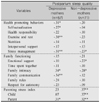Abstract
Purpose
This study aimed to explore the subjective sleep quality of depressed and non-depressed mothers in the late postpartum period and to determine the relationship with their health promoting behaviors, family functioning, parenting stress.
Method
A non-probability sample of 128 mothers completed a self-administered questionnaires at 4-6weeks postpartum. The Edinburgh postnatal Depression Scale (EPDS) and Pittsburgh Sleep Quality Index were used to measure mother's experiences of depression symptoms and sleep. Related factors of sleep quality were measured by the Korean Family Functioning Scale, Health Promoting Lifestyle Profile, and Parenting Stress Index. The data was analysed using t-test, one-way ANOVA, and the Pearson's correlation coefficients.
Result
The results indicated that the depressed mothers(EPDS≥10) had poorer sleep quality than the non-depressed mothers(EPDS<10), reported shortened sleep duration, and experienced more daytime dysfunctions. Depressed mothers who had no job, did not drink coffee, and were primipara tended to report poorer sleep quality. There were significant correlation between poorer sleep quality and lower health promoting behaviors, higher family intimacy and lower family communication, and higher parenting stress among depressed mothers.
Conclusion
Our findings support the view that depressed mothers' experiences of poor sleep are much higher than non-depressed mothers and multi-faced. Nurse professionals should screen for sleep problems in the depressed mothers with a different biopsychosocial and behavioral aspect from the non-depressed mothers in the late postpartum period.
Figures and Tables
Table 1
Comparison of maternal characteristics between postpartum depressive and non-depressive mothers (N=128)

Table 2
Comparison of main variables between postpartum depressive and non-depressive mothers (N=128)

References
1. Ahn O.S. The influence of parenting stress and social support on postpartum depression among mothers during puerperium. 2004. Gyeongju: Dongguk University;Unpublished master's thesis.
2. Ahn T.M., Kim J.H. Comparison of maternal self-esteem, postpartal depression, and family function in mothers of normal, and of low birth-weight infants. J Korean Acad Nurs. 2003. 33(5):580–590.
3. Armstrong K.L., Van Haeringen A.R., Dadds M.R., Cash R. Sleep deprivation or postnatal depression in later infancy: separating the chicken from the egg. J Paediatr Child Health. 1998. 34:260–262.
4. Bai J.I. Construction of a postpartum depression model. 1996. Seoul: Ewha Womans University;Unpublished doctoral dissertation.
5. Blyton D.M., Sullivan C.E., Edwards N. Lactation is associated with an increase in slow-wave sleep in women. J Sleep Res. 2002. 11:297–303.
6. Buysse D.J., Reynolds C.F. III, Monk T.H., Berman S.R., Kupfer D.J. The pittsburgh sleep quality Index: a new instrument for psychiatric practice and research. Psychiatric Research. 1989. 28:193–213.
7. Choi H.J., Yoo Y.J. The development of Korean family functioning scale. J Korean Home Management Association. 2003. 21(3):15–28.
8. Civic D., Holt V.L. Maternal depression symptoms and child behavior problems in a nationally representative normal birth weight sample. Matern Child Health J. 2000. 4:215–221.
9. Cox J.L., Holden J.M., Sagovsky R. Detection of postnatal depression development of the 10-item Edinburgh postnatal depression scale. Br J Psychiatry. 1987. 150:782–786.
10. Dennis C.L., Ross L. Relationships among infant sleep patterns, maternal fatigue, and development of depressive symptomatology. Birth. 2005. 32(3):187–193.
11. Friedman M.M. Family nursing theory & assessment. 1981. New York: Appleton-Century-Crofts.
12. Han K., Kim M., Park J. The edinburgh postnatal depression scale, Korean version: Reliability and validity. J Korean Soc Ther Psychiatry. 2004. 10(2):202–207.
13. Huang C.H., Chang S.H., Chin C.C. Correlates of stress perceived by women during puerperium(Chinese). Public Health Quarterly. 1993. 20(1):29–45.
14. Huang C.M., Carter P.A., Guo J.L. A Comparison of sleep and daytime sleepiness in depressed and non-depressed mothers during the early postpartum period. J Nursing Research. 2004. 12(4):287–295.
15. Jo L. A study on factors influencing the health promoting behaviors in postpartal women. 1998. Kwangju: Chonnam National University;Unpublished master's thesis.
16. Kang M.J., Matsumoto K., Shinkoda H., Mishima M., Seo Y.J. Longitudinal study for sleep-wake behaviours of mothers from pre-partum to post-partum using actigraphy and sleep log. Psychiatry Clin Neurosci. 2002. 56:251–252.
17. Kwon M., Kim H., Kim N., Jang J. Postpartum depression and maternal role confidence, parenting stress, and infant temperament in mothers of young infants. J Korean Acad Child Health Nurs. 2006. 12(3):314–321.
18. Lee E. A study on quality of women's sleeping by their age group. 2004. Seoul: Ewha Womans University;Unpublished master's thesis.
19. Lee J.Y. Fatigue, parenting stress and sleep patterns of women according to period of postpartum. 2006. Daegu: Keimyung University;Unpublished master's thesis.
20. Manber R., Armitage R. Sex, steroids and sleep: a review. Sleep. 1999. 22(5):540–554.
21. Nishihara K., Horiuchi S. Changes in sleep patterns of young women from late pregnancy to postpartum: Relationships to their infant's movements. Percept Motor Skills. 1998. 87:1043–1056.
22. O'Hara M.W., Swain A.M. Rates and risk of postpartum depression: a meta-analysis. Int Rev Psychiatry. 1996. 8:37–54.
23. Park Y.J., Shin H.J., Ryu H., Cheon S.H., Moon S.H. The predictors of postpartum depression. J Korean Acad Nurs. 2004. 34(5):722–728.
24. Richard R., Abidin R. Parenting Stress Index (PSI). 1990. Charlottesville, VA: Pediatric Psychology Press.
25. Ross L.E., Murray B.J., Steiner M. Sleep and perinatal mood disorders: a critical review. J Psychiatriy Neurosci. 2005. 30(4):247–256.
26. Song J.E. Predictors of postpartum fatigue between early and late postpartum period in parturient women-divided by 3/4 weeks of postpartum period. Korean J Women Health Nurs. 2007. 13(4):299–309.
27. Walker S.B., Sechrist K.R., Pender D.J. The health promoting lifestyle profile: Development and psychometric characteristics. Nurs Res. 1987. 36(2):76–81.
28. Wolfson A.R., Crowley S.J., Anwer U., Bassett J.L. Changed in sleep patterns and depressive symptoms in first-time mothers: Last trimester to 1-year postpartum. Behav Sleep Med. 2003. 1(1):54–67.
29. Yang M.S. Relationship between postpartum depression and parenting stress of mother with infant. 2000. Seoul: Kyung Hee University;Unpublished master's thesis.
30. Yeo J.H. Postpartum depression and its predictors at six months postpartum. Korean J Women Health Nurs. 2006. 12(4):355–362.




 PDF
PDF ePub
ePub Citation
Citation Print
Print




 XML Download
XML Download